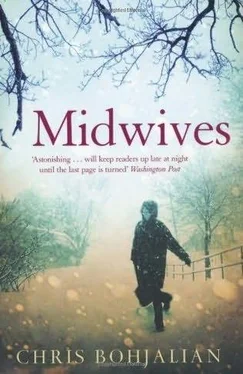Chris Bohjalian - Midwives
Здесь есть возможность читать онлайн «Chris Bohjalian - Midwives» весь текст электронной книги совершенно бесплатно (целиком полную версию без сокращений). В некоторых случаях можно слушать аудио, скачать через торрент в формате fb2 и присутствует краткое содержание. Жанр: Современная проза, на английском языке. Описание произведения, (предисловие) а так же отзывы посетителей доступны на портале библиотеки ЛибКат.
- Название:Midwives
- Автор:
- Жанр:
- Год:неизвестен
- ISBN:нет данных
- Рейтинг книги:5 / 5. Голосов: 1
-
Избранное:Добавить в избранное
- Отзывы:
-
Ваша оценка:
- 100
- 1
- 2
- 3
- 4
- 5
Midwives: краткое содержание, описание и аннотация
Предлагаем к чтению аннотацию, описание, краткое содержание или предисловие (зависит от того, что написал сам автор книги «Midwives»). Если вы не нашли необходимую информацию о книге — напишите в комментариях, мы постараемся отыскать её.
Midwives — читать онлайн бесплатно полную книгу (весь текст) целиком
Ниже представлен текст книги, разбитый по страницам. Система сохранения места последней прочитанной страницы, позволяет с удобством читать онлайн бесплатно книгу «Midwives», без необходимости каждый раз заново искать на чём Вы остановились. Поставьте закладку, и сможете в любой момент перейти на страницу, на которой закончили чтение.
Интервал:
Закладка:
To the jurors, of course, she might simply have looked guilty. She might simply have looked like a tired woman who couldn't sleep because of the blood on her hands.
But at least in the first two hours of her testimony, she spoke well. She was eloquent when Stephen asked her to explain why she had become a midwife, and why helping women to have their babies at home was important to her. She sounded like the most reasonable person in the world when Stephen asked her about the role hospitals usually played in her practice.
"If I see a danger, I will never let a mother's desire to have her baby at home-even if it's a really powerful desire-cloud my judgment. If there are any indications at all that the baby is in distress, I will always transfer the woman to the hospital."
"What about the mother?"
"Same thing. If there's a problem developing, we'll go to the hospital. A lot of people think midwives are anti-hospital or anti-doctor. We're not. I'm not. I have a great relationship with B.P.-Dr. Hewitt. I do what I do-I help ladies have their babies at home-because I know that I can depend on hospitals and doctors if a medical emergency develops."
And as reasonable as my mother sounded when she discussed hospitals, she was every bit as confident and unwavering when she offered her version of what had transpired on the morning of March 14.
"Did you check one last time to see if the woman had a pulse?" Stephen asked.
"Yes."
"Did you hear one?"
"No."
"Did you check one last time to see if she had a heartbeat?"
"Yes, absolutely."
"And did you hear one?"
"No, I did not."
"You did everything possible to make sure the woman was dead?"
"Oh, yes."
"What about the baby? Did you check to see if the baby was alive?"
"Yes, I did. I listened for a heartbeat with the Fetalscope. And I heard one," she answered, looking directly at Stephen as she spoke. She never allowed her gaze to wander toward my father and me, or toward the other side of the courtroom, where she might risk eye contact with Charlotte's family.
"I did everything I could before I began to try and be sure that Char-the mother-had died, but the baby was still alive," she answered.
"Where were the father and your apprentice when you checked? Were they with you?"
"No, they weren't in the room. I think they were still in the kitchen."
"Getting the knife?"
"That's right."
"So they never saw you check the woman or the baby?"
"No."
"But you did?"
"Yes. For sure."
Midmorning Tom Corts arrived in the courtroom, and I was both surprised and glad. With the exception of the small space beside the Fugetts, there were no seats left, and so he stood beside one of the court officers near the door, with his back flat against the rear wall.
It was sometime near eleven o'clock that my mother's answers started sounding less precise and some of her responses began to grow slightly fuzzy. She had been on the stand for close to two hours, answering questions for Stephen that ranged from such generalities as the sorts of words she might use to convey risk to parents at a first trimester meeting, to the specifics of why she had ruptured the membranes that dammed Charlotte Bedford's amniotic fluid.
"I didn't ask Asa in so many words, 'May I save the baby?' and maybe I should have, but at the time I was just focused on the baby-the baby and the mother-and that conversation seemed unnecessary," she said at one point, fumbling a bit as the adrenaline that had gotten her through most of the morning began to dissipate.
"Am I correct in saying that conversation was unnecessary because in your opinion Asa understood exactly what you were planning to do, and had therefore given his consent?" Stephen asked, trying to bail my mother out.
"Objection. Leading the witness, Your Honor."
"Sustained."
"Did you believe Asa had given his consent?"
"Yes," my mother said.
And then, a few moments later, when Stephen asked, "Did the father try and stop you?" she volunteered an answer that I know wasn't part of the script: "Asa was a husband as well as a father, and no husband in that situation would be in any condition to make any kind of decision."
"But in your judgment he made a… conscious decision not to stop you, correct?"
"Correct."
Before the day began, I had worried about the cross-examination, but never about my mother's direct testimony. I did now: I did not believe my mother wanted to be convicted, but as the morning drew to a close, some of her responses almost made it sound as if she no longer cared. Unfortunately, Stephen didn't dare end her testimony at that moment, because then the cross-examination would begin before lunch. I think Stephen thought it was paramount to keep her on the stand until close to noon so the cross-examination would not start until after lunch and he could use the noon recess to buck up her spirits and get her refocused.
Just before eleven-thirty, while still in the midst of her direct testimony, she slipped into one of her answers a sentence that none of us expected, and for which Stephen himself wasn't prepared. If it wasn't the single most damaging thing she could have said from our perspective, it was among the most surprising. It changed everything, and everyone in the courtroom knew it changed everything the moment she said it:
HASTINGS: And the father was still beside the window?
DANFORTH: Yes, he was sitting in the chair there, holding his baby in his arms. He was looking down at him, and Anne was right beside him-kneeling on the floor. From where they were they could see there was a body on the bed, but I know they couldn't see the… the incision, and I was glad. I thought it would have been too painful for them to have seen it. I don't recall actually turning out the light by the bed when I was through, but I looked at my notebooks the other day and I saw that I had.
Stephen immediately tried to clarify what she meant, asking, "You mean your medical notebooks, correct?" but it was too late.
"No," my mother answered slowly, her voice meek with shock. She knew instantly what she had done, and she knew what would happen. "My personal notebooks. My diary."
There was no dramatic rumble or murmur in the courtroom, because we were all too stunned to speak. All except Bill Tanner.
With a voice that sounded almost ebullient, he asked the judge if he could approach the bench, and then he and his deputy and Stephen and Peter all congregated before Judge Dorset. In my row, my father, my grandmother, Patty, and the two law clerks stared straight ahead in silence, trying to keep their emotions inside them. But I knew what they were feeling. Everyone in the courtroom knew what they were feeling, because everyone in the courtroom knew what this meant. Even if, like me, they didn't know exactly what the law was or what exactly would happen next, they all knew that my mother had just announced to the prosecution that there existed notebooks they had never seen that might have a direct-and devastating-bearing on her case.
…
This is the law: In the discovery process in the state of Vermont, Stephen Hastings was under no obligation to inform Bill Tanner that my mother's personal notebooks existed, or to turn them over to the prosecution.
This is the fact: My mother had told Stephen soon after they met that the notebooks existed, and he had read some of them-at least some of them, maybe whole years' worth. When he saw that some of the entries from mid-March could be construed as incriminating, he told her to stop keeping what was in essence a personal diary, and to never speak of the diary again until after the trial. She said she would abide by both requests, and then ignored both-one by design, and one by accident. My mother was simply incapable of not keeping a diary. She had kept one throughout her entire adult life, and it was probably unrealistic to expect her to stop chronicling her actions and emotions in the midst of the worst stress she would ever experience.
Читать дальшеИнтервал:
Закладка:
Похожие книги на «Midwives»
Представляем Вашему вниманию похожие книги на «Midwives» списком для выбора. Мы отобрали схожую по названию и смыслу литературу в надежде предоставить читателям больше вариантов отыскать новые, интересные, ещё непрочитанные произведения.
Обсуждение, отзывы о книге «Midwives» и просто собственные мнения читателей. Оставьте ваши комментарии, напишите, что Вы думаете о произведении, его смысле или главных героях. Укажите что конкретно понравилось, а что нет, и почему Вы так считаете.











